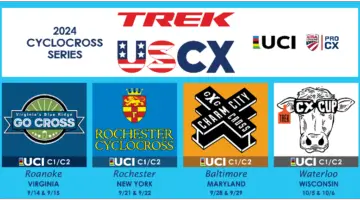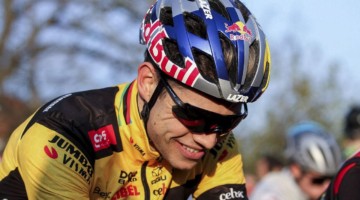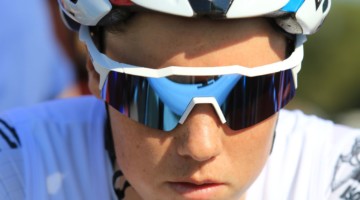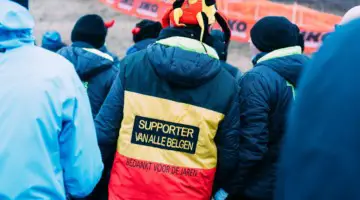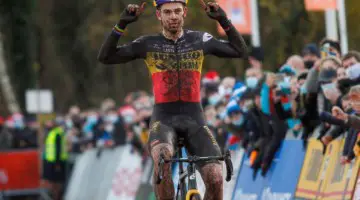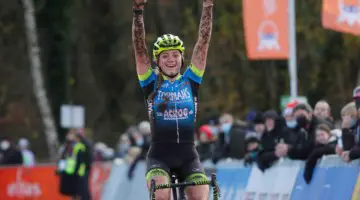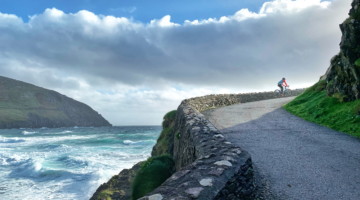After Elite Nationals in Louisville, Rebecca Gross (Zero D Racing) boarded a plane and headed to Belgium for the rest of the European racing season. Similar to CXM columnist Corey Coogan Cisek, Gross tested her ’cross skills against the world’s best and in the process, got her first taste of living and racing in Europe.
Now in her late 30s, Gross has experienced a lot during her long cycling career. Gross got her start racing at the highest level on her mountain bike, and now boasts a 2012 Masters Cyclocross World Championship and 2014 U.S. Masters Cyclocross National Championship as two of her top accomplishments.
In her professional life, Gross served in the Air Force for nearly a decade, and after leaving the military, she obtained a Masters degree in sports psychology from the University of Denver. When she’s not racing, Gross now coaches a number of endurance athletes.
We recently caught up with Gross after her incredibly busy cyclocross season where she started a total of 47 (!) races, from UCI World Cups to Masters Nationals to local races in Belgium.
See below for our interview with Gross.
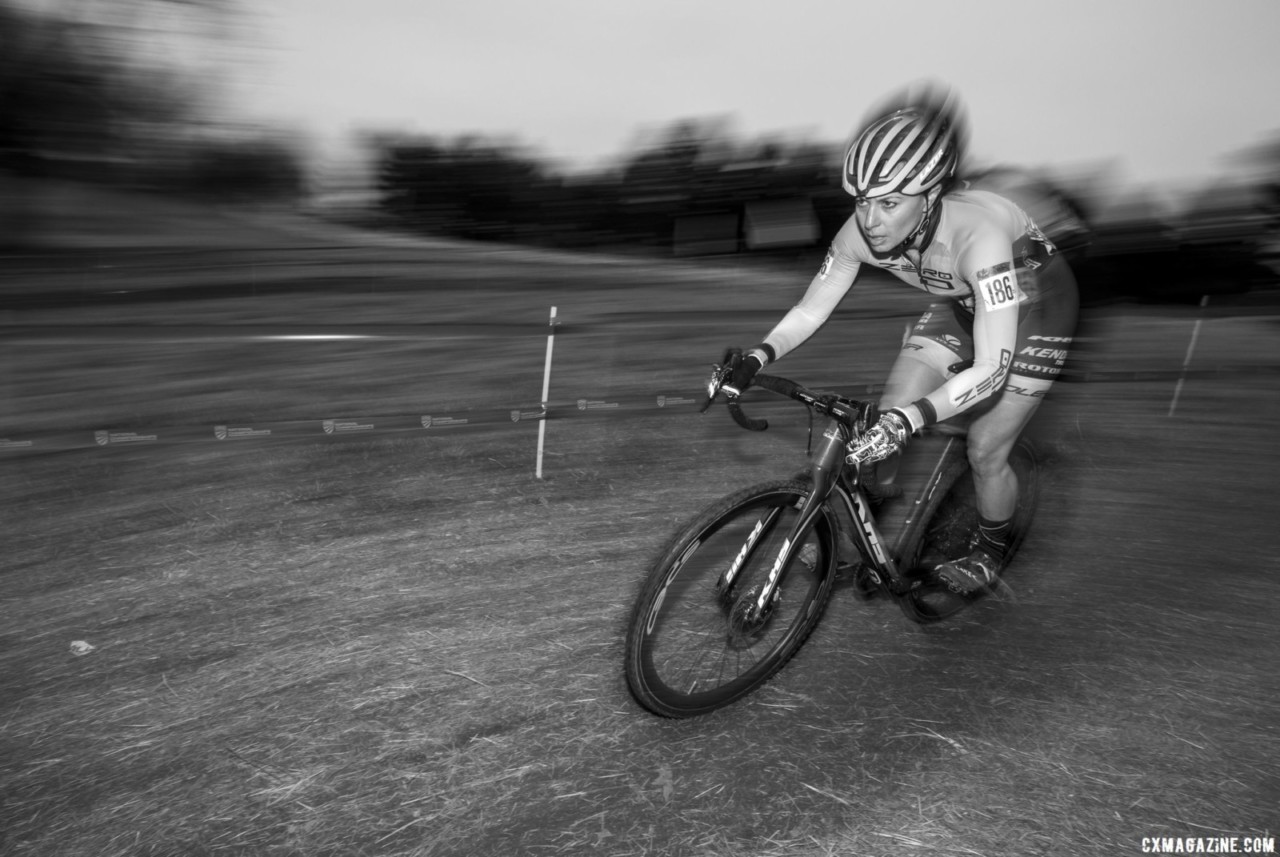
Rebecca Gross raced 47 times this cyclocross season. Masters Women 35-39. 2018 Cyclocross National Championships, Louisville, KY. © A. Yee / Cyclocross Magazine
Interview with Rebecca Gross of Zero D Racing
Cyclocross Magazine: Congrats on a long, impressive cyclocross season. It just finished, but how do you view it in terms of what you set out to achieve and your goals?
Rebecca Gross: Traveling and competing at a whole new level of course severity and scale of competition definitely leaves me with a feeling of accomplishment and a satisfaction that I can successfully navigate the intricacies of European cyclocross. I’m excited to plan my return for the 2019-2020 season knowing what I now know and having learned a lot about myself over there.
CXM: We read you did 57 races since September 2? How many of these were UCI cyclocross races? Local races? How much of this was mapped out prior to the season?
RG: Actually I believe that number is 47! It was 36 UCI races, 3 at home locally to get the season started, 1 World Cup, 2 national championships because I also raced Masters and 3 non-UCI races when I was in Netherlands and Belgium. One of the China races wasn’t UCI this year, and I raced a local race in Texas because I love being a part of that community when I’m down there.The non-UCI races in Europe were not planned out. I had no idea about them but they were all on days there was a World Cup, so otherwise no UCI racing.
I really enjoyed seeing different spots in the countries and meeting people and trying out a different flavor of racing, The last two local races in the Netherlands were hellishly muddy and it would have been likely been wiser to train somewhere dry like indoors than wreck the bikes, but it’s good to get the experience of handling the bike in those conditions when no one is concerned about the damage to the ground.
CXM: At Nationals you said suffered from injuries and pain and had to go to the doctor between your Masters race and Elite Nationals. What were you dealing with?
RG: I have a few structural quirks that I ride with after a number of years with intense back pain and a partially ruptured disk there were talks of surgery and never riding a bike again from the medical side and needless to say those ideas didn’t satisfy me.
After five years, instead of fighting my imbalances, I embraced them and incorporated a few specific exercises into my workouts to keep the muscles strong and stable. It’s been working very well for the past five years now and I hadn’t had a relapse until this fall.
CXM: After Nationals, you hopped on a plane to head to Europe. How were the ailments across the pond, and how did the trip go compared to your expectations?
RG: I didn’t have super high expectations for Elite Nationals, I tend to either do really well or be completely out of the ball game. When I walked into the ER after the Masters race on Thursday, I was more concerned about lugging 2 bikes, 3 sets of wheels and all the gear required for 3 months in Europe around an airport and then sitting on an airplane for 10 hours. They set me up with some meds that released my muscle spasms and while I was still hurting in the Elite race on Sunday, I was able to move a bit more.
It progressively just went away and I was back to feeling like myself, although a very cautious, somewhat timid and much weaker version of myself.
I didn’t really have expectations for Europe, I believe the trip was more on the discovery level. I had so little idea of what to expect and I how I was going to make it all happen that I just took everything one step at a time.
CXM: What was the biggest takeaway from the 2-plus months in Europe?
RG: For one, it’s way warmer over there than home. The grass stays green in the fields, but the gloomy days and frequent rain are taxing for someone who loves to be outside in the sunshine. The resiliency of the local people to the elements is notable; they are outdoors doing activities no matter what the weather. The number of spectators willing to stand out in the cold and wet to watch a race that is largely televised is eye-opening as an American, just as the number of local folks who are still commuting by bike when the temps dip below freezing and it’s snowing out.
At home, cyclocross is such a niche sport, an even tinier portion of the larger niche sport of general cycling. In Europe, the Elite racers are celebrities. I had cars tailgate me for miles just inches off my bumper on a wide open highway trying to get a glimpse of the bikes on the car or folks staying in the house next to mine find me at the race to say “success.”
Much of the race parking is in residential areas. Entire neighborhoods are blocked off for the mass amounts of spectators that walk through, the RVs and tents and parking. No one seems to mind, rather they watch from balconies, join the fray, offer their hose or invite you in for showers.
Most of the racers have an RV, so when they are getting ready, they have their own private space and more importantly, their own bathroom facility. Public urination is as common as seeing a dog pee outdoors, but still, you don’t see the women doing it. It’s intimidating to leave your bike sitting outside a port-o-potty in the middle of crowds of drunk spectators, but if you ask someone to watch your bike they are thrilled to help out and will, in turn, ask your name and cheer for you during the race.
The same goes for leaving your jacket on the start line. It likely won’t be there when you get done if you just hang it on the fence it, but if you ask anyone to hold it they are more than happy to help and greet you at the finish holding it open for you to put back on. Deciding who the right person to ask for these favors can take a little practice!
I found the culture to be very giving and friendly with a penchant for making do with less. Everything is smaller—cars, driving lanes, parking spots, the shower, the hot water heater, the sink, the refrigerator. There are fewer options in the stores—besides bread—and practically no one owns a clothes dryer.
Playgrounds are less colorful, highly engineered structures and more open spaces in the woods, children seem more independent, walking to school on their own or playing without adult supervision. There are subtle but fascinating differences between the countries and a lot of pride in individual nationality.
CXM: For part of your European campaign, there were a bunch of other Americans at the same races. Do these competitors become virtual teammates over there? Train or dine together?
RG: We did joke about that a bit, “Team America” and all. The answer is yes and no. I stayed with friends from the U.S. for the first few weeks, but once they went home, I stayed with a Dutch friend who happened to live on the edge of Germany. It’s cheaper rent there. So I never really trained or did meals with the other Americans, although the ones staying together in Siddard with USAC or at the Chainstay in Oudenaarde I’m sure did.
For the races though, we were all very well cared for by the Cyclocross Customs crew who took care of the mechanical work, pitting, cleaning and start line needs. We generally sought out the registration or “inschrijvingen” together, warmed up with each other, went out for the pre-ride laps and chatted at call-ups. It was really nice to know there were a few English speakers with you no matter where you went but also folks to discuss how you could actually find peanut butter in the store if you looked in the right spot or get more racer cards made online.
CXM: How do you split your time between racing and coaching, and what else keeps you busy? How many clients do you average?
RG: I still view riding and training as what I truly want to do with my day, so I try to get the “work” done first before I go out. I coach around 15 people at any given time. It fluctuates a bit with the seasons but that takes up the bulk of my mornings.
In the summer, I coach a Junior program at home known as GBX or the “Golden Bicycle Experience.” I’m also working to help put a local nonprofit together to make mountain bike racing in Colorado a bit more cohesive—we have a lot of stand-alone races and no major overlying series so the goal is to find a motivation for folks to attend more events throughout the summer.
I used to have more things in my life that did not evolve around bikes, but at some point, I realized I was very happy being surrounded by this community, so until it becomes less fun I don’t feel a strong need to diversify.
CXM: Do you have a coach yourself? Or coach yourself?
RG: I have had a coach for about the past 10 years, and I really enjoy working with someone. This past season, I came to a very slow realization that some of the messages were getting crossed and it was hindering my ability rather than helping, so I tried a switch which ended up not working out.
I have had some solid successes coaching others, and while it can be intimidating to make decisions for your own training, I know my own limits best so I’m going to go ahead and give self-coaching a shot.
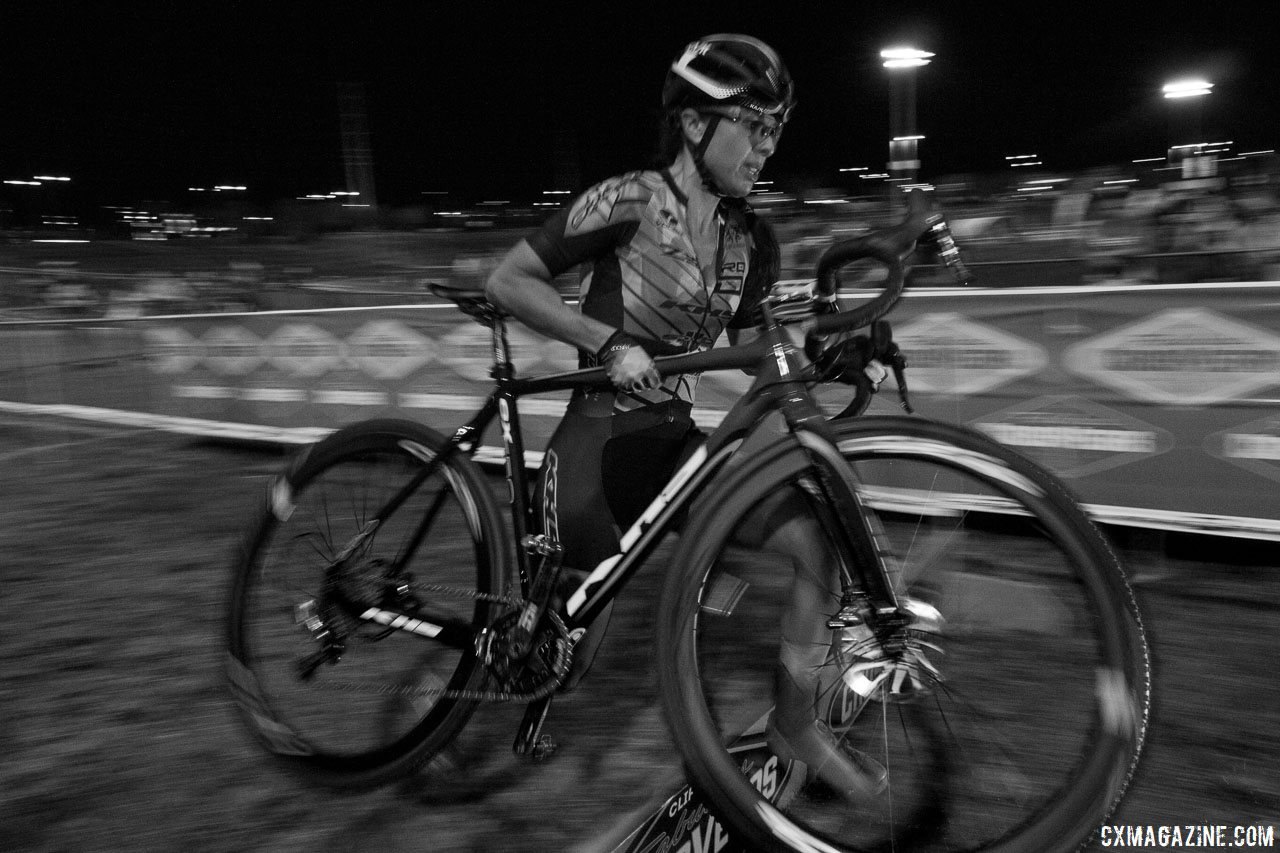
Gross is going to try coaching herself this coming season. 2017 CrossVegas, Elite Women. © A. Yee / Cyclocross Magazine
CXM: How do you make such a long European trip work financially?
RG: My largest expense was for the car and plane tickets and baggage fees. I didn’t eat out much when I was there, and for the bulk of the time, I was staying with a friend who is planning to do some American mountain bike racing this season and will allow me to return the favor. Racing doesn’t require entry fees or paying to park so the cost wasn’t too much out of the realm of what I spend normally.
CXM: What advice would you have for Americans who want to do a long racing block in Europe?
RG: Talk to the folks who have been there and figured it out. The first year is always going to be a little bit of a shock, whether it’s the severity of the courses or the size of the crowds. You have to be adaptable, generally people love or hate the transition to European lifestyles and racing. In the U.S. you can get by with strong fitness, as most of our courses aren’t explicitly technical but the crazy can be what ’cross is about over there.
It isn’t a bad idea to pick an area to stay in that is central to Belgium as the bulk of the racing is there. There are a number of people who specialize in hosting bike racers or teams who also have cars with racks to rent out, so it’s a matter of word or mouth with the folks who have been there or heavy Googling with the translate feature on to figure out what works best.
Little things like phone service, using your credit card in certain places or how to get gas can be tricky, but ultimately those little details all work themselves out. Having the means and a system to wash clothes and bikes is important because you end up doing that almost daily. Bring racer cards because you will get asked for them multiple times per race. Prepare to eat a lot of bread and waffles.
CXM: Your KHS frames are a model offered a few years back. Are these the same frames you’ve been racing for several seasons, or do you swap out each season to new old stock frames? Are the wheels and components from the same year, or do you need to replace those more often?
RG: KHS is a very respectable bike company who feels that cyclocross is a bit too small potatoes to heavily invest in. They respect and care for me as a rider, but they stopped making the cyclocross frame a few years back in exchange for a gravel concept. The fat tire 27.5″ wasn’t as suited for cyclocross, so I’ve been on the same frames for the past few years.
Speed Precision is a small understated carbon wheel company in SoCal that designs and manufactures both the hubs and rims on primarily mountain bike wheels. The wheels are lightweight but reinforced to be bombproof, and I can attest to the success of his engineering. I’ve been running the wheels for a few years now with few issues other than bearing replacements.
Components are expensive when you are running your own program and budget, so I try to make them last as long as conceptually possible. This tends to leave me with bikes that don’t shift as great or easily as they should but it is what it is.
CXM: What is Zero-D Racing? What’s behind the name?
RG: I did a few years of ’cross racing with various programs. Most of the time my experience was positive but there seemed to always be some form of discontent going that would eventually overwhelm me in the overall purpose of race results and positive exposure. After the first year of being a privateer and having direct interaction with my sponsors as well as choosing who I spent time around while racing, I realized there was a lot more happiness involved and it left me with a much calmer, more peaceful perspective of what I was trying to do.
The “D” stands for “drama,” although I’ve had a few other iterations—hopefully jokingly—suggested.
CXM: Do you think your military background helps you as a bike racer? If so, how?
RG: One of the biggest takeaways I had from eight years in the military was that excuses are unacceptable. The only way to see improvements in yourself and your racing is to own up and take responsibility for your actions. There will always be times when you are sick or factors are indeed out of your control, but ultimately people want to hear around how you are making change for the better, even if that process is not instantaneous.
Seeing your actions through is something I take for granted; the idea of not finishing what I start in any context usually doesn’t cross my mind. I find that perhaps this might harm me as much as it helps, there have been many occasions, such as Masters Nats, where not racing would have been the better judgment call but this one is quite engrained into my mind—see things through and make real-time, within-the-action decisions as long as quitting isn’t part of the equation.
I also had a healthy dose of priorities. Conflicts are ugly things but ultimately you are there to care for others. If it’s not your own people directly it is indirectly. Bike racing is a lot more than just showing up to a start line. It’s equipment procurement and maintenance, housing and travel, training and preparation. It could be said that the easiest part is lining up.
Stress over all those other things will impact your performance, so if you pass through showing respect for those you come into contact with, be it sponsors, race promoters, bike shops, local clubs and programs, hosts, or training partners, they in turn respect you and are interested in helping you succeed.
CXM: Thanks for your time. Hope you get a chance to enjoy the offseason!
RG: Thank you.
For more from Gross, you can follow her on her blog.











